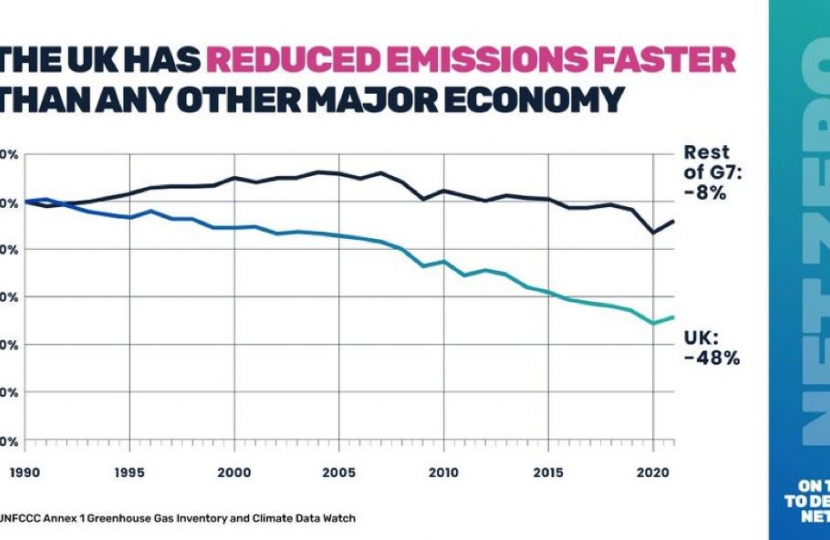
Weekly Column
Which country has cut carbon emissions faster than other major economies since 1990? The UK. Which country has more ambitious targets for reductions than other major economies by 2030? The UK. Surprisingly, those facts may not have come across in coverage of the Prime Minister’s speech last week which recommitted to achieving Net Zero by 2050.
So what did the Prime Minister announce? He set out a new pragmatic and proportionate approach to ensure we meet our international commitments without imposing unnecessary costs on families. It builds on our track record in cutting emissions by 50 per cent since 1990 and plans to deliver further reductions of 68% by 2030 – faster than other major Western countries.
I know from my mailbag and talking to constituents there is strong support for maintaining our leading position on climate change. People rightly want to protect our environment and for the UK to meet our promises at Paris and Glasgow to help limit global warming. However, many have also expressed concerns about the costs of transition - particularly those living in rural areas and off grid worried about potential bans on oil boilers and requiring heat pumps.
So instead of banning boilers before people can afford alternatives, the new plan moves back that date while increasing upgrade grants by 50 per cent to £7,500. It also recognises for some properties heat pumps will not be practical or affordable. Powers in the Energy Act regarding renewable liquid fuels have the potential to enable those households to convert oil boilers and cut emissions by nearly 90 per cent.
Another change is bringing the deadline for ending the sale of petrol and diesel vehicles into line with Germany, France, Spain, Italy, Canada, and other places to 2035. Most cars sold by 2030 are still expected to be electric as costs fall, range improves, and charging infrastructure grows. Nissan, for example, has announced that all its European production will be electric by then.
Energy efficiency is another critical part of reducing emissions and making homes cheaper to heat. So the government has launched a new £1 billion programme to help families on the lowest incomes in less energy efficiency homes save around £300-400 on annual energy bills. This will cover upgrades such as roof or cavity wall insulation. Check eligibility for that scheme gov.uk/apply-great-british-insulation-scheme or one for off grid homes gov.uk/apply-home-upgrade-grant
The new approach also wants to exploit the opportunities of green industry. That means ambitious targets for offshore wind and other renewables – and new measures to bring that power to households and businesses quicker – investing in new nuclear, and new funding for R&D.
This approach means changes required to meet net zero can be achieved in a fairer way that enjoys public support. It recognises legitimate concerns people have about the potential costs and eases the transition. At the same time, it increases incentives for home insulation, the boiler upgrade scheme, and boosts investment in green energy projects. While I understand there is some concern about the potential impact, let's be clear – the UK remains committed to meeting our targets and international commitments.
This article first appeared in the Lynn News 29 September 2023

